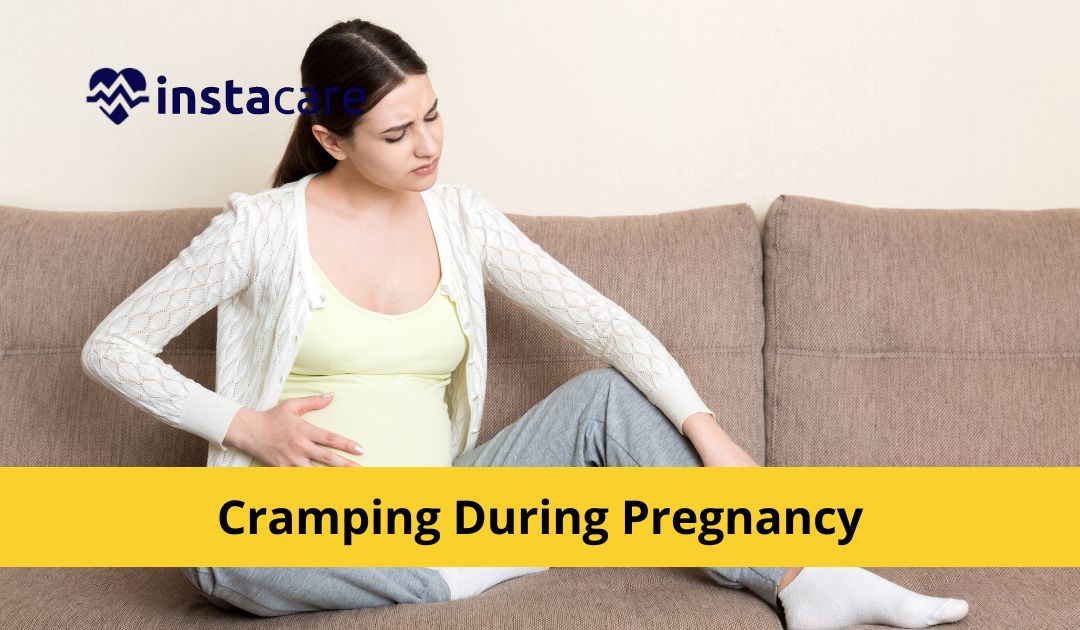Are you pregnant and noticing cramps? Pregnancy can come with a variety of unfamiliar sensations, so it is not unusual for those expecting to experience some muscle spasms during this exciting but sometimes challenging process.
However, if you notice recurring or worsening cramps, then it is important to speak with your medical professional as soon as possible. In this blog post, we will explore the causes and varying degrees of pregnancy-related cramping in order to better understand how best to take care of yourself and baby.
Are cramps during pregnancy normal?
Cramping during pregnancy is a common occurrence, however it can still be alarming for expecting mothers. While cramps usually occur as the uterus is stretching to accommodate the growing baby, cramps can also be caused by dehydration or decreased circulation in your legs.
If you are experiencing cramps during pregnancy, it is important to reach out to your doctor to ensure everything is normal. Your doctor may suggest that you drink more fluids and stretch more frequently, which can help relieve cramping. With a little extra care, both you and your growing baby can feel safe and secure throughout pregnancy.
What causes cramps during pregnancy?
Cramping during pregnancy is a common symptom that can occur at any stage of pregnancy. It is usually caused by the normal changes that occur in the body as it adjusts to the growing fetus. Some of the most common causes of cramping during pregnancy include:
Round ligament pain: this is a sharp pain or dull ache that occurs on one or both sides of the lower abdomen. It is caused by the stretching of the ligaments that support the uterus as it grows.
Constipation: pregnant women are more likely to experience constipation due to hormonal changes that slow down the digestive process. This can lead to cramping in the lower abdomen.
Gas and bloating: as the uterus expands, it can put pressure on the intestines, causing gas and bloating.
Braxton hicks contractions: these are practice contractions that can occur throughout pregnancy. They are usually painless, but they can be felt as cramping or tightening in the uterus.
Preterm labor: cramping during pregnancy can also be a sign of preterm labor, which occurs before 37 weeks of pregnancy. Other signs of preterm labor include contractions, lower back pain, and a change in vaginal discharge.
It's important to note that cramping during pregnancy can be a sign of a more serious problem, such as an ectopic pregnancy or a miscarriage. If you experience severe or persistent cramping, or if you have any other symptoms such as heavy bleeding or fever, seek medical attention immediately.
View More: Bleeding After Sex During Pregnancy Is It Normal
Cramping during the first trimester of pregnancy
Cramping during the first trimester of pregnancy is a common experience for many expecting mothers. During the cramping, a woman may feel discomfort in her abdomen and lower back. This can range from mild to intense pain depending on the individual.
Sometimes cramps may be accompanied by spotting or light bleeding, however this type of cramping does not necessarily indicate a miscarriage and can often be attributed to implantation or buildup of hormones. It is important for mothers-to-be experiencing cramping during their first trimester to consult their healthcare provider right away in case further tests are necessary.
Cramping during the second trimester of pregnancy
During the second trimester of pregnancy, cramping is actually quite common. While cramping can cause some discomfort and may even be mistaken for preterm labor, they are a normal part of the body's adaptation to carrying a baby. Some cramps may occur as your growing baby puts pressure on certain parts of your abdomen or as your uterus stretches and adjusts to accommodate the fetus.
It is important to speak to your healthcare provider if you experience cramping during your pregnancy as there may be an underlying medical concern that needs attention. Most cramping in the second trimester however, are usually nothing to worry about as long as there is no accompanying bleeding.
Cramping during the third trimester of pregnancy
Cramping during the third trimester of pregnancy is a common and often unpleasant experience for many women. While cramping in general can be worrisome, cramps occurring during the later stages of a pregnancy should not cause panic. As its name suggests, cramping typically happens when the muscles tighten and relax abruptly, but it is possible to experience cramps in any part of the body - including those in your uterus.
Usually cramping during this period is merely the result of your body's preparation for labor and delivery, which can include braxton hicks contractions or cramps from other activities like sneezing, exercising or even laughing suddenly. If you find cramping at this stage persistently uncomfortable or painful, be sure to speak with your healthcare provider to ensure everything is proceeding smoothly with your pregnancy.
View More: Pregnancy Symptoms Week By Week 42 Weeks
How to relieve pregnancy cramps?
Pregnancy brings exciting changes, but cramping during pregnancy can be quite a hassle. Fortunately, there are several remedies that can help provide relief from cramps caused by embryo development. One of the simplest and most effective approaches is to do light exercises like stretching or taking a walk or swim.
Taking a hot bath and applying a heating pad or ice bag to the affected area can also be useful. Increasing the intake of calcium-rich foods such as leafy green vegetables and milk has been known to reduce cramping during pregnancy, so maintaining a balanced diet is essential.
Lastly, prenatal massage therapy can help relieve cramps because it decreases stress, relaxes tense muscles and increases blood circulation throughout the body. With these strategies in mind, pregnant women should not have to suffer through those nagging cramps any longer!
Conclusion
The bottom line is, it’s important for pregnant women to climb and be aware of the signs and symptoms of cramping. Cramping can be caused by a number of factors including stretching of the ligaments and muscles, the growth of the baby, or even constipation. It’s advised to speak with your healthcare provider if you experience intense or persistent cramping while pregnant. Fortunately, there are various ways to reduce these uncomfortable sensations right away.
Consider trying gentle stretching exercises or taking a warm bath if cramps become severe. While some women may find instant relief when changing positions or getting up and walking, others may find more comfort in applying heat to the area that hurts most. This simple trick can also help relax tense muscles and reduce spasms since pain signals can be blocked by heating pads or hot water bottles.
Lastly, pregnant women looking for other solutions should try to eat smaller meals more often as well as get plenty of rest throughout the day in order to avoid tummy cramp troubles! Ultimately, knowing about these issues can empower expecting moms to take proactive steps in managing their own health and wellbeing during pregnancy. So don't forget to call your healthcare provider if you experience any kind of cramping during pregnancy; it could just save you from unnecessary stress!
Please book an appointment with the best Gynecologist in Lahore, Karachi, Islamabad, and all major cities of Pakistan through InstaCare, or call our helpline at 03171777509 to find the verified doctor for your disease.












